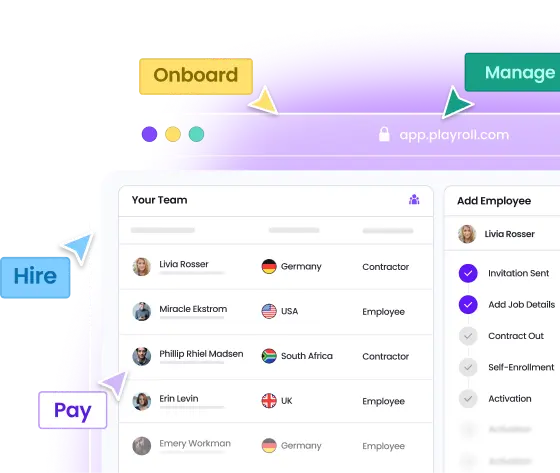What Are the Standard Working Hours In Spain?
Employees aged 18 or older are allowed to work a maximum of 40 hours per week of actual work, spread over five days, with daily limits of 8 hours. A minimum meal interval of 15 minutes must be observed by employees who work more than 6 hours in a day. Typical working hours in Spain generally run from 9:00 AM to 6:00 PM, Monday through Friday, with a usual midday break around 2:00 PM to 4:00 PM, although exact hours may vary depending on sector and collective agreements.
An employee who is 16 years old or younger is not permitted to work. Employees aged 16 or older but under 18 have restricted working hours that cannot exceed 8 hours per day and 40 hours per week, with specific prohibitions on night work.
Maximum Working Hours in Spain
- Legal cap: The standard maximum working hours in Spain are 8 hours per day and 40 hours per week of actual work. A new law is expected to reduce this to 37.5 hours by December 31, 2025.
- Weekly average: The 40-hour limit is calculated as an average over a 12-month reference period.
- Overtime exceptions: Employers can request employees to work overtime, but the total overtime hours cannot exceed 80 hours per year. Overtime must be compensated either by pay or time off in lieu, as stipulated by law or collective bargaining agreements.
- Restrictions: Overtime is voluntary except under exceptional circumstances. Overtime exceeding legal limits can incur penalties.
Industry Specific Exceptions
Certain industries have specific working time regulations due to their nature:
- Healthcare and social services: Extended shifts and on-call hours are common but regulated by specific sector collective agreements.
- Transportation (road, maritime, air): Strict rules apply to driving and rest times to ensure safety, often superseding general working hour limits.
- Agriculture and tourism: Seasonal peak periods may allow more flexible or extended hours, subject to labor agreements.
These exceptions typically allow longer daily hours or different rest arrangements but remain bound by overall weekly maximums and mandatory rest periods.
Managerial and Exempt Employees
Managerial or executive employees (trabajadores con poder de mando) in Spain are defined by their capacity to hire and dismiss or make autonomous decisions regarding business management.
Working hours: Managerial employees are generally exempt from the strict application of working hour limits and overtime compensation rules.
Contract terms: They often have different contractual terms and may have flexible hours with no entitlement to overtime pay, provided their remuneration and role meet legal requirements.
Statutory Full-Time Working Hours in Spain
Full-time employment is legally defined as 40 hours per week on average, with actual hours worked and rest periods regulated. Full-time hours apply uniformly across most industries but can be subject to variation by collective agreement.
Part-time work: Defined as working fewer hours than full-time employees with proportional rights.
Overtime Regulations in Spain
Overtime work is tightly regulated in Spain to protect employees and ensure work-life balance. It must be compensated appropriately and limited in quantity.
What Counts As Overtime in Spain?
Overtime is any work performed beyond the standard 40 hours per week of actual work. This excludes normal breaks and is calculated excluding paid leave or holidays. Voluntary extra hours, emergency work, or agreed additional hours under collective agreements count as overtime.
Maximum Overtime In Spain
The maximum overtime allowed by law is 80 hours per year. Any additional overtime beyond this limit may result in legal penalties and fines for the employer.
Employees are entitled to compensatory rest or extra pay for overtime hours worked.
Overtime Payout Rates In Spain
Overtime must be compensated either through pay or equivalent time off. The law typically requires overtime to be paid at a premium rate, commonly time-and-a-half (150%) or double time (200%), depending on sector agreements. Overtime on Sundays and public holidays usually commands a higher premium.
Collective agreements may specify exact rates and compensatory mechanisms, which can vary by industry.
Rest Periods and Breaks In Spain
Employees working more than 6 hours daily must be given a minimum uninterrupted rest break of 15 minutes, often longer depending on collective agreements.
Between shifts, employees must have a minimum rest period of 12 consecutive hours. Weekly rest: Employees are entitled to at least one and a half days of rest per week, usually Sunday plus Saturday afternoon or Monday morning. Certain industries, such as transport and healthcare, have specific rest requirements to ensure safety and health.
Employers are responsible for ensuring rest periods are observed and properly documented.
Night Shifts and Weekend Regulations
Night work is defined as work performed between 10:00 PM and 6:00 AM.
Night shift workers are entitled to additional compensation or reduced working hours. Night workers cannot exceed 8 hours per day on average over a reference period, and are entitled to free health assessments before starting night work and at regular intervals thereafter. Weekend work is permitted but often compensated with premium pay or time off according to collective agreements. Spanish labor law requires employers to provide special considerations and additional remuneration for night and weekend shifts to compensate for the inconvenience and health impact.
Disclaimer
THIS CONTENT IS FOR INFORMATIONAL PURPOSES ONLY AND DOES NOT CONSTITUTE LEGAL OR TAX ADVICE. You should always consult with and rely on your own legal and/or tax advisor(s). Playroll does not provide legal or tax advice. The information is general and not tailored to a specific company or workforce and does not reflect Playroll’s product delivery in any given jurisdiction. Playroll makes no representations or warranties concerning the accuracy, completeness, or timeliness of this information and shall have no liability arising out of or in connection with it, including any loss caused by use of, or reliance on, the information.
.svg)
.svg)
.svg)





.svg)



.png)











.webp)









.svg)